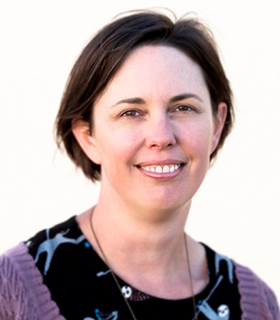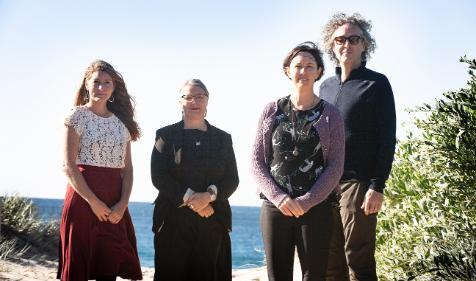In the lead up to International Women’s Day on March 8, each day the Global Challenges Program is profiling one of the many brilliant women we work with to celebrate their contribution to knowledge, and to celebrate all women who have contributed to creating a better, more equal world.
Dr Michelle Voyer, Blue Futures keystone

Dr Michelle Voyer is a Senior Research Fellow with the Australian National Centre for Ocean Resources and Security (ANCORS) at the University of Wollongong. She has a ten-year career in Australian state and federal government, as well as marine science undergraduate training.
Michelle’s research focuses on the human dimensions of marine conservation and resource management, and the nexus of social science and policy. Her Global Challenges keystone project Blue Futures, deals with the economic development of ocean and marine resources, through a sustainable development model, that maximises the social, environmental and economic benefits derived from the oceans.
What does it mean to you to be a female academic and to be a part of the Global Challenges Program?
Working with local communities on the types of impactful, interdisciplinary research that Global Challenges promotes is an absolute privilege. Gender is something I am really interested in from a research perspective and part of the social science process is reflecting on how your own circumstances and values influence your research. I have been privileged to conduct research with a range of people who live, work and play in coastal and ocean environments and my perception is that being a woman is often an asset in an interview setting. I am convinced that many burley, tough fishermen have opened up to me in ways they perhaps would not to a male interviewer. It is a huge honour and a huge responsibility to be trusted in that way.
Why are more women needed in this space and why should more women become researchers?
My research is very engaged in questions of pluralism. The diverse ways of thinking, knowing and being in the world profoundly influence the ways in which societies function. I think our research community should reflect our pluralistic society if we want to address the big problems of our age. This means striving for diversity in our research teams. Gender equity is crucial for this, but diversity needs to also be thought of more broadly to include people from a range of backgrounds, value and belief systems and disciplines.
What makes you passionate about your research area?
I started working in marine conservation because I wanted to save the oceans! It seemed pretty simple back then that the answer was Marine Protected Areas. I worked for ten years in Government on protected areas, threatened species and coastal development and learnt pretty quickly that nothing is that simple and the thing that makes the job of conservation the most complicated is people. Ever since I have been fascinated with learning about how to better consider, account for and engage with humans in oceans governance. I still want to help save the oceans (and I still think protected areas have a role to play) but I recognise now that simplistic solutions to complex problems are never the answer.

What does “Each for Equal” mean to you? What do you think needs to be done to ensure this?
I have really benefited from the efforts of earlier generations of remarkable women. I feel grateful to have never had to call into question my right to pursue my personal and professional goals. Even in my lifetime the advances have been remarkable, and I think it is fantastic that the women coming after me will have a far different understanding then I did of what they should expect from their workplaces, colleagues and society more broadly. Discrimination now has far fewer places to hide but there is still work to do. The most urgent and pressing need to me is in the area of family violence and the need to work with young boys and men to instil mutual respect and empathy from an early age.
Do you have an achievement in your career that you are most proud of?
The recent success of our Global Challenges keystone application ‘Blue Futures’ is an achievement which neatly sums up all the things I aspire to in my career – inspiring, challenging and thought provoking collaborations, impactful and applied research and meaningful partnerships with community, Government and industry. The program, which we will roll out over the next two years, is incredibly exciting. It is the culmination of many years of collaboration and conversations but also a big dose of happenstance and luck. I can’t wait to see where it leads us.
Who inspires you?
Two women in particular had a profoundly formative impact on me. The first is my mum. She is an academic too, who completed her PhD whilst raising five kids. She also worked as a lecturer and was an active volunteer in our community, especially our school where she was president of the P&F amongst a range of other things.
Even today in retirement, mum is actively engaged in a number of largely volunteer roles and is an advocate for social justice and equity, particularly in the health sector.
Despite how busy she was and is, I have never questioned that we were and are her priority. There was also never any question in our house of gender roles, everyone had to pitch in and Dad was a great role model in that regard too.
The second person was my friend, mentor and colleague, Meredith Hall, who played a huge role in my early career in Government. She taught me so much; to back myself but also to know when to ask for help; to think strategically but also to maintain a focus on core values and objectives; and to always question the status quo, and how things could be done better. Her passion, dedication and sense of humour inspired me immensely. She passed away very suddenly over 15 years ago, at the age of only 33. The oceans lost a major advocate that day.